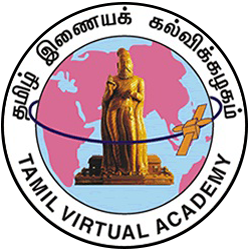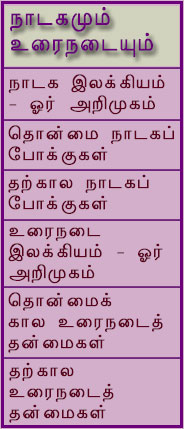Primary tabs
-
LESSON - 5
p20345 The Characteristics of Ancient Tamil
Prose
This lesson discusses the unique features of ancient Tamil
prose. Tamil prose grew from poetry. Attempts to write ‘urai’
or commentaries on poetic texts led to the origin of prose. In
the beginning prose closely resembled poetry in style. Ancient
stone inscriptions were rendered in prose. These were in the
language of the common man and were written in short
sentences. The ancient grammar text ‘Tholkappiam’ defines
prose and lists its various types. According to ‘Tholkappiam’
there are 4 types of prose. During the Sangam period there
was a practice of including terse explanatory comments under
poems. However, these commentaries were written in a lofty
style intelligible only to the learned. The post sangam epic
‘Silapathigaaram’ contains the earliest form of Tamil prose.
The verses in this epic are punctuated by ‘Urai Peru Katturai’
or ‘Uraippaatumadai’ which are lengthy expository discourses.
Since these occur largely in those sections of the epic that
deal with drama and music, there is a belief that prose must
have evolved from drama. In the later years the custom of
writing commentaries for literary texts fuelled the growth of
prose. Irayanaar’s ‘Kalaviyal Urai’ was the first book to show
that prose was different from poetry. This book which follows
the structure of question and answer ushered in many
changes in Tamil prose. Similarly ‘Baratha Venba’ written by
Perunthevnaar in the 9th century A.D. set down simplicity and
clarity as the chief aspects of prose. ‘Uraiaasiriyargal’ or
commentators played a key role in shaping Tamil prose. This
lesson discusses the works of 9 prominent uraiaasiriyars
highlighting their unique contribution to the growth of Tamil
Prose. They are Ilampooranar, Senaavaraiyar, Peraasiriyar,
Parimelazhagar, Adiyaarkku Nallaar, Nachinaarkkiniyar,
Theivachilaiyaar and Sankaranamachivayar. The advent of
Vaishnava and Jain uraiaasiriyars led to the rise of a new
prose style called ‘Manipiravaala Nadai’. This style was
characterized by the use of words borrowed from other
languages, especially Sanskrit.



